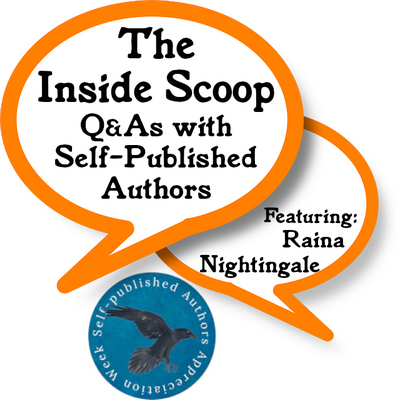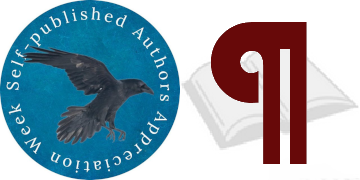
Earlier this morning, I featured a Guest Post from Raina Nightengale, Self-Publishing Freedom. Now we get to chat with her about some other aspects of self-publishing. Nightengale’s another author who came my way from JCM Berne and has been super-easy to work with, and has been very enthusiastic about these posts. I really appreciate her time for this.
Before we get into things, why don’t you give the reader a brief introduction to you and your work.
Hello. I’m Raina Nightingale, and I like trees, volcanoes, the night sky, dragons, and lightning storms – and deep explorations of (usually non-romantic) relationships. Not necessarily in that order. I’ve been writing ever since I learned how to read in about one week when I was eight years old, and I call my writing dawndark high fantasy as a kind of umbrella term, since while it sometimes gets dark, there’s always the promise of hope and when I explore the darkest places, it’s in order to find a deeper hope that can overcome them.
Epoch of the Promise: Dawn Unseen and Epoch of the Promise: Vision’s Light are my darkest books. I’ve since discovered they’re less unique than I thought they were when I wrote them (I hadn’t encountered epic grimdark fantasy yet), but I think they are still very unique, since – though they are not at all gory – they are saved from being grimdark only by scandalous redemption, and explore religion and the impact that can have on people’s lives from the perspectives of some very theologically-inclined characters at times.
Heart of Fire, which is the first book of the Dragon-Mage series, is basically classic high fantasy with a twist: instead of focusing on fight scenes, the focus is on relationships and personal struggles. It’s also set in a world reviewers have praised for its ancient and lived-in feel, and a fresh, unique magic system and take on dragons. If you’ve read lots of dragonrider books, but you’ve always wanted the dragons to be a bigger part of them, Heart of Fire may be the book for you (that, by the way, is how I feel about a lot of dragon books).
And if you’d like something a little cozy, Kindred of the Sea is about two men, platonic lovers, forced to desert the army and become traitors when the dreams of an enchanted forest show them that their nation’s war is unjust – and eventually fall through a portal onto an ocean world where they’re befriended by magical dolphins.
You can find me on Twitter (https://twitter.com/Areaer_Novels) and my website (https://enthralledbylove.com) where I post lots of art, as well as reviews of books I read, and occasionally other musings as well.
You can find all my books here, from whichever retailer you’d prefer, (https://books2read.com/raina_books) and be advised: I’ll usually have a discount of some sort going on one book or another if you like Smashwords.
And you can check out my books Goodreads (https://www.goodreads.com/book/show/79130352-heart-of-fire).
What are some of the biggest misconceptions you find that readers have about self-published books?
That because we have different priorities than a traditionally published authors, and we don’t want to give up control over our story, that somehow means we care about it less. Care less about making it the best it can be. I might have a different idea of what ‘perfect’ or ‘best’ is than other people do. I think all artists have their own vision of ‘perfect’, and this is part of what makes art art: the attention to the thing I see and I want to share. But that doesn’t mean I’m any less rigorous in seeking that vision.
I’m not self-publishing because I’m afraid I’m not good enough for a traditional publisher. I’m self-publishing because I’m not letting anyone change my story to be any less than what I want it to be. I’m not letting anyone change my story so that it appeals less to me and those I want to reach, because that might make it marketable to a wider audience or whatever the reason is. That’s how art loses it soul, and in the end it can’t win the world either. And I’m not willing to take the risk of not being able to publish later, dependant works because the first ones don’t do well enough or my publisher otherwise doesn’t want to pick them up.
Do you do your own cover design, or have you found people to help with that? It seems almost as difficult as writing the novel itself–talk about the process a bit.
When I was just a child, I saw these covers on traditionally published books that did not have the details inside the book right (if it was only the MC having the wrong color hair). I didn’t like that, and promised myself I’d do my own book covers when I published my books. So for a long time I did that – gradually getting better at it. And some of my pieces I really love – Vision’s Light, Heart of Fire, and the two new Legend of the Singer covers are among these.
Design-wise, it’s always been pretty easy. I’m a very visual thinker, and by the time I’m done writing a book, I usually know what kind of scenes and elements I want on the cover. The hardest ones were probably the Legend of the Singer books though, because I didn’t have a good scene or image from Children of the Dryads that I just sensed had to be the cover, and I wanted most of them to match. So the current image is kind of representative. The scene it depicts probably happens, but is not described in the story.
Doing the actual art, however, is quite a lot more difficult. And now that I’ve discovered Midnight Rose’s art, I might have most of my covers done by Midnight from now. Midnight’s art just makes me want to have it so much, and it was a delight working with Midnight on the new cover for The Gifts of Faeri.
Odds are, you’re doing this from love/passion, not to pay the bills. What keeps you going? I’m assuming there are more “who”s than “what”s, actually–who is it?
I have to write. Stories are how I think, challenge my thoughts and convictions, and develop them. How I explore new ideas. I can’t sleep if I don’t tell my stories, one way or another. So writing … that’s always going to be a part of my life.
Publishing is a bit different. That’s a lot more costly than just writing, and the time and energy I have to put into publishing – and marketing/PR stuff – can take away from the art I love. So what’s keeps me going here, are the occasional comments of readers, and perhaps even more the fact I know I have stories that people need to hear, and I know there are people out there who want my stories, just like I would have wanted them – and want to find more that are like them. The struggle is finding them, making it so that they can find me, and it’s a struggle some of them probably share from the other end. And if I give up, we won’t ever connect.
Self-publishing tends to have less external deadlines keeping one accountable. How do you maintain your work process or work ethic?
One of the first reasons I knew I could never be a traditionally published author is that external deadlines are the bane of my creative process. In fact, even the kinds of planning and deadlines that self-publishing can involve are tricky for me to handle and figure out.
My work process thrives off entirely internal energy: I love art, and I love making my thing whatever I think is perfect/the best it can be. So I do that. And not having deadlines means that when one story isn’t flowing, but a new one shows up in my head, I don’t have to be worried about giving that one my energy and attention. And I think that is the trick to how productive I can be.
Thanks for your time and participation! Hope you enjoyed it! And do know that there are many of us out here who appreciate and applaud what you do (and our number is growing)!
Be sure to check out all of her work!

Clker-Free-Vector-Images from Pixabay
The 2023 Self-Published Authors Appreciation Week Logo was made by Witty and Sarcastic Book Club



Raina Nightingale
Thank you so much for the interview! It was really fun to answer these questions!
HCNewton
I appreciated your answers! Glad you were sent my way!!